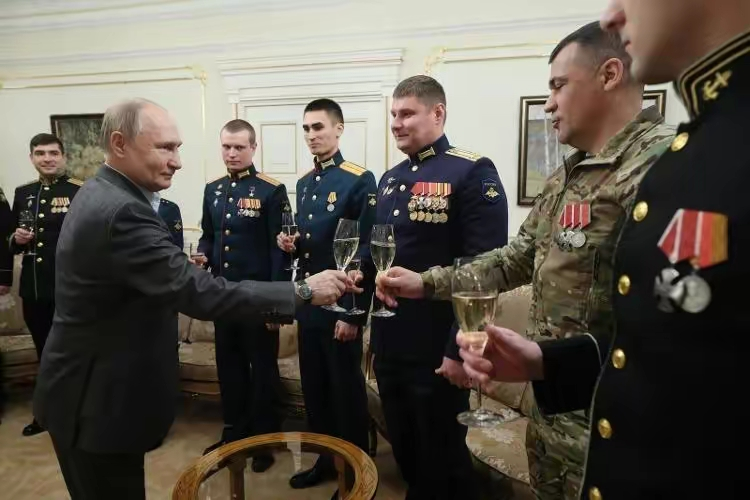
On the early morning of March 18th local time, the Central Election Commission of Russia released data stating that out of 85% of the votes counted in the Russian presidential election, current President Putin received 76277708 votes, far ahead of other candidates with a vote share of 87.19%. Therefore, Putin has actually won the presidential election.
It is reported that Harritonov of the Communist Party of the Russian Federation ranks second with 4.24% of the vote, while Davankov of the Russian New Party ranks third with 3.99% of the vote, and Slutsky of the Russian Liberal Democratic Party ranks fourth with 3.16% of the vote.
On March 18th, in Moscow, Russia, Putin delivered a speech to the media at the campaign headquarters. Putin stated that he will continue to promote national development in the new term. All major tasks for national development have been outlined in the recent State of the Union addresses to both houses of parliament, and we will do our best to achieve the established goals.
Putin's victory this time is not surprising to the public. Putin's iron fisted image has deeply penetrated people's hearts, and in addition to releasing official campaign videos, Putin has also been showcasing his tough guy image in the media in recent days.
On February 21st, Putin inspected the Kazan Aircraft Manufacturing Plant in Russia. Putin personally named one of the Tu-160M strategic bomber planes that is undergoing acceptance by the Russian Ministry of Defense. Subsequently, Putin personally rode and experienced the renovated Tu-160M. After experiencing the bomber, Putin went to inspect the local highways in Kazan and personally drove a domestically produced Kamas truck from Kazan to the multifunctional highway service area.
For Russia, the biggest question when Putin wins and takes office as the country's top leader is which direction the two year long conflict between Russia and Ukraine will take. This is related to the future of Russia and the direction of world geopolitics.
At present, mainstream media around the world, as well as self media and social media, have various analyses and evaluations, and these analyses, evaluations, and predictions are often completely different: some media claim that Russia will collapse, while others claim that Russia will be the ultimate winner.
According to publicly available information, during Putin's previous four presidential terms, Russia has experienced a total of five wars, with the first four ending in Russia's victory. However, there is currently no sign of a ceasefire in this Russia Ukraine war, and it is unclear who will win or lose.
Recently, media reports said that senior Russian military officials warned that the Russia-Ukraine conflict might escalate into an all-out war in Europe. Meanwhile, on February 26th of this year, Putin carried out a major military reform, splitting the Western Military Region and re establishing the Leningrad and Moscow Military Regions that existed during the Soviet era. This move has been interpreted by the outside world, but Putin's desire to return to the glory of the former Soviet Union is not difficult to understand.
On the second anniversary of the outbreak of the Russia-Ukraine conflict, Putin mentioned Russia's special military operations at the beginning of his State of the Union address, stressing that Russia "will make every effort to end combat operations, eradicate Nazis, complete all tasks of special military operations, protect sovereignty and the security of our citizens." In addition, Putin also said that confrontation with the "collective West" is not Russia's choice, but Russia is ready to deal with long-term tensions in relations with the West.
Putin stated that Russia's military actions against Ukraine are supported by the vast majority of Russians, and Russia is fighting for its sovereignty and security. Russia did not provoke the conflict, but will do its best to end it. "The combat capability of the Russian armed forces has doubled, and our forces have firmly taken the initiative, steadily advancing in a series of combat directions."
In fact, Russia's security challenges do not solely come from Ukraine. After Finland joined NATO in April last year, the security distance between Russia and NATO has greatly shortened. From the current perspective, NATO's involvement in the Russo Ukrainian conflict, especially its containment of Russia, is becoming increasingly deep. At present, Russia's strategic nuclear forces are in a fully prepared state, and further observation is needed to determine which move NATO, led by the United States, will take next.

Below is the English translation of the text, with precise handling of political terms, consistent sentence structures, and preservation of the original’s analytical tone and logical flow:
Below is the English translation of the text, with precise …
On December 15 local time, Trump took the British Broadcast…
In recent years, the application of artificial intelligence…
According to Yahoo US media reports, the recent remarks of …
After 11 years of waiting in the deep sea, we finally have …
On December 17, 2025, the newly renovated American "Preside…